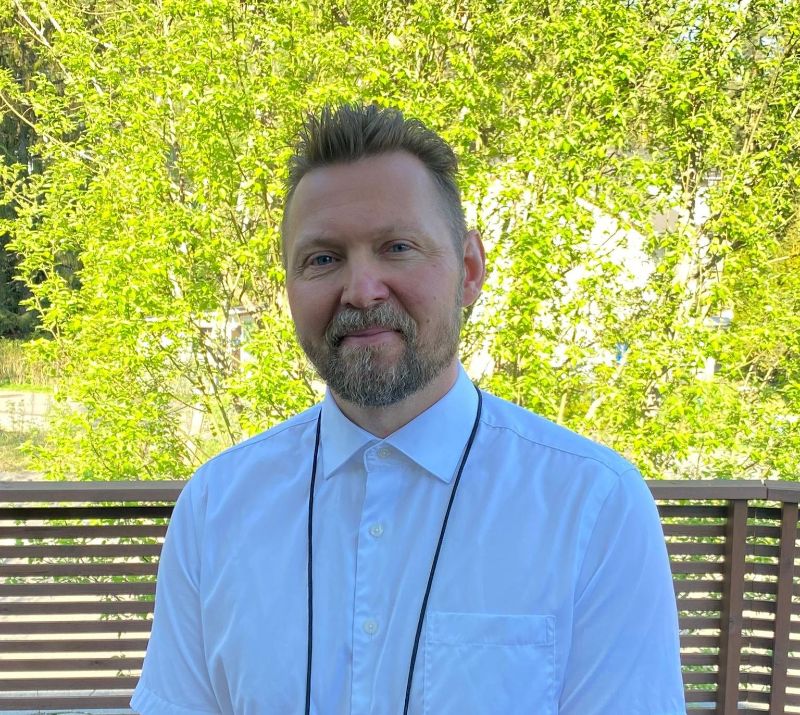Criminal sanctions worker
"A criminal sanctions worker assesses offenders’ criminogenic factors, which are things that are likely to cause, maintain or increase criminal behaviour. It requires good judgement of character and the ability to see the big picture. Criminal sanctions workers have to tolerate setbacks and pressure, but that is something you develop with work experience."

- Mikko Tasanto
- Criminal sanctions worker at the Helsinki Community Sanctions Office.
- Graduated as a community pedagogue from Humak University of Applied Sciences, where he also completed a Master’s degree. He has also previously completed the vocational upper secondary qualifications of the Criminal Sanctions Agency and the security sector. Currently studying the Specialist Qualification in Management and Business Management.
- 23 years of work experience in the field.
Briefly explain what you do for a living.
I am a criminal sanctions worker, which means that do sanctions investigations for assessing offenders’ capacity to do community service. Sanctions investigations are done when a prosecutor or court is considering community service as the form of serving a sentence. At the same time, I prepare an overall assessment of the offender’s life, which includes the past, present and future. It results in a plan for the sentence period, where I comment on how we can support a crime-free lifestyle for the offender during their sentence.
In addition, my duties include organising a place for the offender where they do their community service. I monitor the performance of the community service and maintain regular contact with the offender and the community service facility.
How have you ended up in the profession of your choice?
When I was a child, I dreamed of being a police officer. However, I ended up as a security guard in the private sector thanks to a summer job. Later, I worked as a prison guard. I have also worked in a number of different positions in criminal sanctions, and I am still on that path.
Describe your typical working day or week.
My workday often starts with me opening my computer and checking my emails. I’ll also check if there is any new information on the criminal sanctions sector on our internal communication platform. Then I check my calendar to see what meetings I have scheduled for the day. Usually, my working day includes a few interviews related to sanctions investigations, recording statements, having meetings with community service facilities’ staff and sorting out offenders’ affairs. I also participate in various working groups and training in the criminal sanctions sector.
What kind of work environment or working hours do you have?
I work in a shared office space with multiple people in one room. I also work from home because it helps me focus. I do some travelling to prisons and to the partners of the Criminal Sanctions Agency.
My working hours are flexible, which means that I can start work in the morning between 6:30 and 10:00 and finish in the afternoon between 14:00 and 20:00.
What kind of competence or qualities are required in the profession?
A criminal sanctions worker assesses offenders’ criminogenic factors, which are things that are likely to cause, maintain or increase criminal behaviour. It requires good judgement of character and the ability to see the big picture. Criminal sanctions workers have to tolerate setbacks and pressure, but that is something you develop with work experience.
What is the best thing about your profession?
The best thing is when I am able to verbalise something to an offender face-to-face or in writing in a way that makes them change their behaviour. A person might commit crimes over and over again, but sometimes our conversations make them realise how to break the cycle. It may require a lot of work from me and my colleagues, but it results in a great feeling of success.
What are the downsides of the profession or what seems challenging?
It feels challenging if an offender doesn’t want to change their ways and continues to engage in criminal behaviour. It is also frustrating when an offender does not arrive at an agreed interview.
What would you tell a person considering the profession of a criminal sanction worker?
The criminal sanctions sector may not be the most attractive option for many people considering career choices, but we have a surprisingly wide range of tasks across Finland. There is work available in prisons, community sanctions offices, customer assessment units, enforcement and administration. This is human-oriented work where you can let your personality show, which has a positive impact on job satisfaction in my opinion.
Even if there are no open jobs, you shouldn’t hesitate to contact a unit where you would like to work.
How do you see the future of your profession?
It seems that there will be plenty of work in this sector because the rate of crime will probably not to go down; likely the opposite. Public administration is under pressure to save money, but at the moment it seems that criminal sanctions work is not under the greatest risk.
